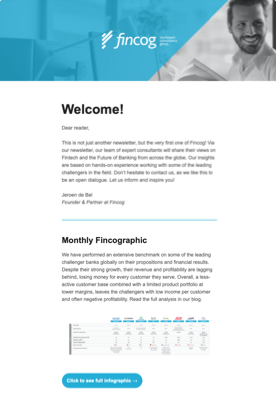This article was orginally published as part of the Holland Fintech publication 'Dutch Fintech Landscape'. A copy can be downloaded via the Holland Fintech website.
OVERVIEW OF THE DUTCH MARKET
The Netherlands is home to a population of 17 million and has the 6th largest GDP in Europe. It’s one of the most digitally advanced nations with: 98% of households having internet acces, 90% of retail card transactions made via cards, 65% adoption rate of mobile banking and payments, and 89% adoption rate online banking and payments.
It has a large e-commerce market worth EUR 25.7 billion in 2019, and growing at 8% per year; and an already mature payments market that continues to lead in terms of innovation, leading to a steady decline of cash usage and the near extinction of cheques. The Netherlands is characterized by a small, concentrated banking market. The top 3 banks of ING, Rabobank and ABN AMRO have a combined market share of around 85% in Retail and Corporate Banking. These banks ofer a similar, modern banking experience with a high emphasis on innovation.
ING for example, has a venture fund of EUR 300 million investing in fntech. Among others, it has created Yolt, an open banking platform active in the UK and other markets.
ABN AMRO successfully introduced Tikkie, a payment app that enables quick, simple payment requests to friends. The app is open to users from all banks, and has over 5 million users with 200 thousand ‘Tikkies’ per day.
Other banks such as De Volksbank, Triodos, NIBC and Van Lanschot account for the remainder of the market. In general these banks ofer slightly less advanced digital propositions and tend to focus on specifc customer segments.
THE STATE OF COOPERATION
The Dutch market benefts from a large degree of cooperation between the banks and other industry stakeholders. For example, in 2005 banks and retailers united in the ‘Convenant Betalingsverkeer’ to lower the cost of debit card payments with unanimous support (‘PIN’). In the same year, iDEAL was successfully introduced. Backed by the ‘top 3’ banks, iDEAL is an online banking enabled payment method for e-commerce. iDEAL nowadays accounts for around 85% of e-commerce transactions, and is largely able to fend of competition from credit cards and PayPal. In early 2019, the ‘top 3’ banks launched a cooperative efort to amalgamate the ATM network under the name ‘geldmaat’. Within 2 years this will fully replace the banks’ own ATM networks.
The Dutch market is one of the best functioning; with one of the lowest cost banking markets internationally; consumers are well protected by supervision and an ombudsman; it’s a relatively low-risk market that was able to keep defaults of retail mortgage to a minimum even during the peak of the fnancial crisis. With banks generally ofering good, modern, efcient banking services.
However, the country is lacking a clear leader in banking innovation.
FEW CHALLENGER BANKS ARE ACTIVE ON THE DUTCH MARKET
Bunq is the ‘most prominent’ Dutch challenger bank. Founded in 2015 with the mission to be the most loved bank of Europe. Under the slogan ‘Bank of the Free’, it aims to revolutionise mobile banking and be fully transparent. The mobile-centric bank ofers personal and business accounts, with a high focus on making transactions easy. Key features include budgeting, notifcations, savings goals, automatic savings, payment requests, split payments, and a travel card, amongst others. With an estimated 35 thousand users, its market share and impact are still meagre – yet it’s setting a benchmark for many other players.
KNAB is the other challenger bank in the Dutch market, founded in 2012 by insurance company Aegon, together with the former founders of Alex Beleggersbank. It ofers a broad range of fnancial services, including current accounts, savings and mortgages, to Retail, Freelance and SME clients. With its motto ‘100% online yet personal’ it aims to ofer premium service including a clear fnancial overview with tools, alerts to plan and control your fnances, and pro-active fnancial advice informing you about better deals. With over 225k thousand users and a good market share in the freelance market, it has made a decent impact. In addition to these local challengers, there are a few foreign players available on the market. Amongst others, Revolut, N26, Monese and Rewire are also available to people in the Netherlands.
However, other key players such as Monzo, Starling Bank or Fidor Bank are not (yet) available in the Netherlands.
OPPORTUNITIES STILL AVAILABLE IN THE DUTCH MARKET
The lack of many challenger banks and few clear front-runners suggest the country potentially still ofers an attractive opportunity for banks looking to expand into new geographical markets.
There is an opportunity to diferentiate as a front-runner in innovation, providing payments with a broader set of innovative banking services.
One could also look at Dutch mortgages, which have above-average interest rates and relatively low-risk compared to other European markets. While plain-vanilla mortgages are heavily competed for by all sorts of players, specifc segments such as reverse-mortgages for the elderly or buy-to-let are growing segments with few players.
Third, wealth management is increasingly digitised and democratized to the mass afuent population.
And there are yet more opportunities when you look closer, depending on your objectives and key assets. We believe that selecting the right niche, tailored to both your organisation and the market potential, is key for long-term success. Structured market research could help identify the unique opportunities for you.
KEYS TO SEIZING OPPORTUNITIES
There are three important generic success factors for challenger banks to successfully capture their position on the market. First, an extensive focus on a specifc niche allows to ofer a winning solution tailored to that segment. Second, a clear diferentiation with unique position and proposition. Third, rigorous control of execution to successfully realize the strategic goals enables to deliver on the potential.
Structured market research could help identify the unique opportunities for you.


